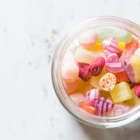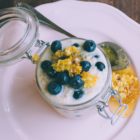
In general, Americans eat too much sugar. And, chances are, you don’t need me to tell you that. Most people are aware that sugar is rampant in our food system and too much is harmful to our overall health. It can increase your risk for certain diseases and crowd out more nutritious food options, such as fruits and vegetables. Too much sugar can also affect your mood, lead to poor gut health and cause you to crave even more sugar.
For optimal health, it’s important to reduce your intake of sugar. In fact, the American Heart Association recommends no more than 25 grams of added sugar per day for women and no more than 36 grams per day for men. However, cutting down on added sugar can be easier said than done — and that’s because sugar is often “hidden” in our food system. It’s found in places you might not even consider looking. So, today I wanted to expose some common sources of hidden sugar, and share some healthier swaps.
1. Salad Dressings
Salad dressings, such as a raspberry vinaigrette or honey mustard, can have up to six grams of added sugar per serving. While that might not sound like a lot, it can add up quickly, especially if you are using it multiple times per day.
Healthier Swap: Choose a brand that has little to zero added sugar, such as:
- Tessemae’s Organic Lemon Garlic (my personal favorite) or
- Newman’s Own Classic Oil & vinegar salad dressing.
You can also opt to make your own dressing. In a pinch, I often use good quality olive oil, ½ lemon (juiced), salt and pepper.
2. Yogurt
Yogurt, both dairy and plant-based versions, are often loaded with added sugar. Even simple vanilla flavored yogurt can contain up to nine grams of added sugar per serving. Dairy-free versions, such as coconut or almond milk yogurts, are often even higher in sugar, ranging from 11-17 grams of added sugar per serving. That is similar to ½ cup of vanilla ice cream!
Healthier Swap: Opt for plain (unflavored) yogurt in both dairy and non-dairy versions.
3. Bars
Bars, such as protein and snack bars, are often more like candy in terms of sugar than a health food. Don’t be fooled by pretty packaging. Sugar amounts can range anywhere from 5-18 grams of added sugar per serving.
Healthier Swap: Make your own bars at home or choose a lower sugar option, such as Bulletproof bars.
The American Heart Association recommends no more than 25 grams of added sugar per day for women and no more than 36 grams for men.
4. Condiments
Just like salad dressings, condiments can be full of sugar. Ketchup, for instance, has about four grams of added sugar per tablespoon. Barbecue sauce can add a surprising 16 grams of sugar per serving. These are not always places you’d consider finding hidden sugar, so it’s always important to look at labels on packaged foods.
Healthier Swap: Opt for lower sugar options, such as mustard or mayo.
5. Beverages
Unless you’re drinking plain water, coffee and/or tea, you are most likely drinking a beverage that contains added sugar. A serving of lemonade, for instance, has up to 28 grams of added sugar. A serving of sweetened iced tea can have up to 30 grams of added sugar per serving. Kombucha, coffee drinks, and smoothies can also contain high sources of added sugar.
Healthier Swap: Keep it simple and pay attention to what is in your drinks. Bubbly water like La Croix, plain water and plain coffee all contain zero grams of added sugar.
Remember these tips — and always check the label on packaged foods — and you’ll be well on your way to reducing added sugar in your diet.
- Eating Behavior (47)
- Grocery Shopping Tip (9)
- Gut Health (42)
- Healthy Eating (49)
- Low FODMAP (13)
- Nutrition Articles (32)
- Recipes (27)
- Uncategorized (4)



